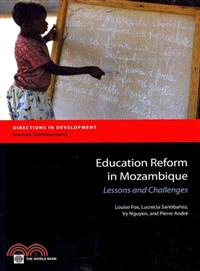Education Reform in Mozambique: Lessons and Challenges
商品資訊
系列名:Directions in Development
ISBN13:9780821389751
出版社:World Bank
作者:Louise Fox; Lucrecia Santibanez; Vy Nguyen; Pierre Andre
出版日:2012/05/01
裝訂/頁數:平裝/118頁
規格:22.9cm*15.2cm*1.3cm (高/寬/厚)
定價
:NT$ 1557 元優惠價
:90 折 1401 元
無庫存,下單後進貨(到貨天數約30-45天)
下單可得紅利積點:42 點
商品簡介
相關商品
商品簡介
Coming out of civil war, Mozambique had an enormous education deficit. In 1997, five years after the peace treaty, 80 percent of the labor force reported to have no education at all, and school enrollment outside the large cities was miserable. Since then, Mozambique has come a long way in improving access to lower and upper primary through sustained investments in education infrastructure and introduction of important reforms. The primary education reform programs implemented in 2004, combined with a continuing program of school construction and teacher training, resulted in a 70% increase in enrollment in EP1 over 4 years with the highest gains for the poorest and most vulnerable children. Yet there was only a slight increase in student/teacher ratios. How did Mozambique do this, and what are the lessons going foward? The most important part of the reform appears to be the removal of the national school fee for primary level and the provision of free textbooks. These reforms provided the boost that poorer households needed to get their children in school. Continued investments in school construction helped as well. However, despite these efforts, there is still an education deficit. In 2008, over 1 million children who should be attending primary school were not. Over half of the children who began grade 1 in 2000 did not complete grade 7 by 2008. One reason is that school costs remain high, especially for grades 6 and above (EP2+). And quality is still not adequate in many schools. As a result, the transformation of the labor force is slow, as over half of the females who entered the labor force in the decade since 1997 did not even complete EP1.Analysis of employment and livelihood opportunities indicates that the transition out of subsistence agriculture requires primary education. This means that to achieve inclusive growth, the key strategic objective of the education system needs to be ensuring that as many children as possible start and finish primary school with competency in the basic subjects, as well as the skills to allow them to find productive economic activities and make these activities payThis book is aimed at policy makers in the education field. .
主題書展
更多
主題書展
更多書展今日66折
您曾經瀏覽過的商品
購物須知
外文書商品之書封,為出版社提供之樣本。實際出貨商品,以出版社所提供之現有版本為主。部份書籍,因出版社供應狀況特殊,匯率將依實際狀況做調整。
無庫存之商品,在您完成訂單程序之後,將以空運的方式為你下單調貨。為了縮短等待的時間,建議您將外文書與其他商品分開下單,以獲得最快的取貨速度,平均調貨時間為1~2個月。
為了保護您的權益,「三民網路書店」提供會員七日商品鑑賞期(收到商品為起始日)。
若要辦理退貨,請在商品鑑賞期內寄回,且商品必須是全新狀態與完整包裝(商品、附件、發票、隨貨贈品等)否則恕不接受退貨。
























